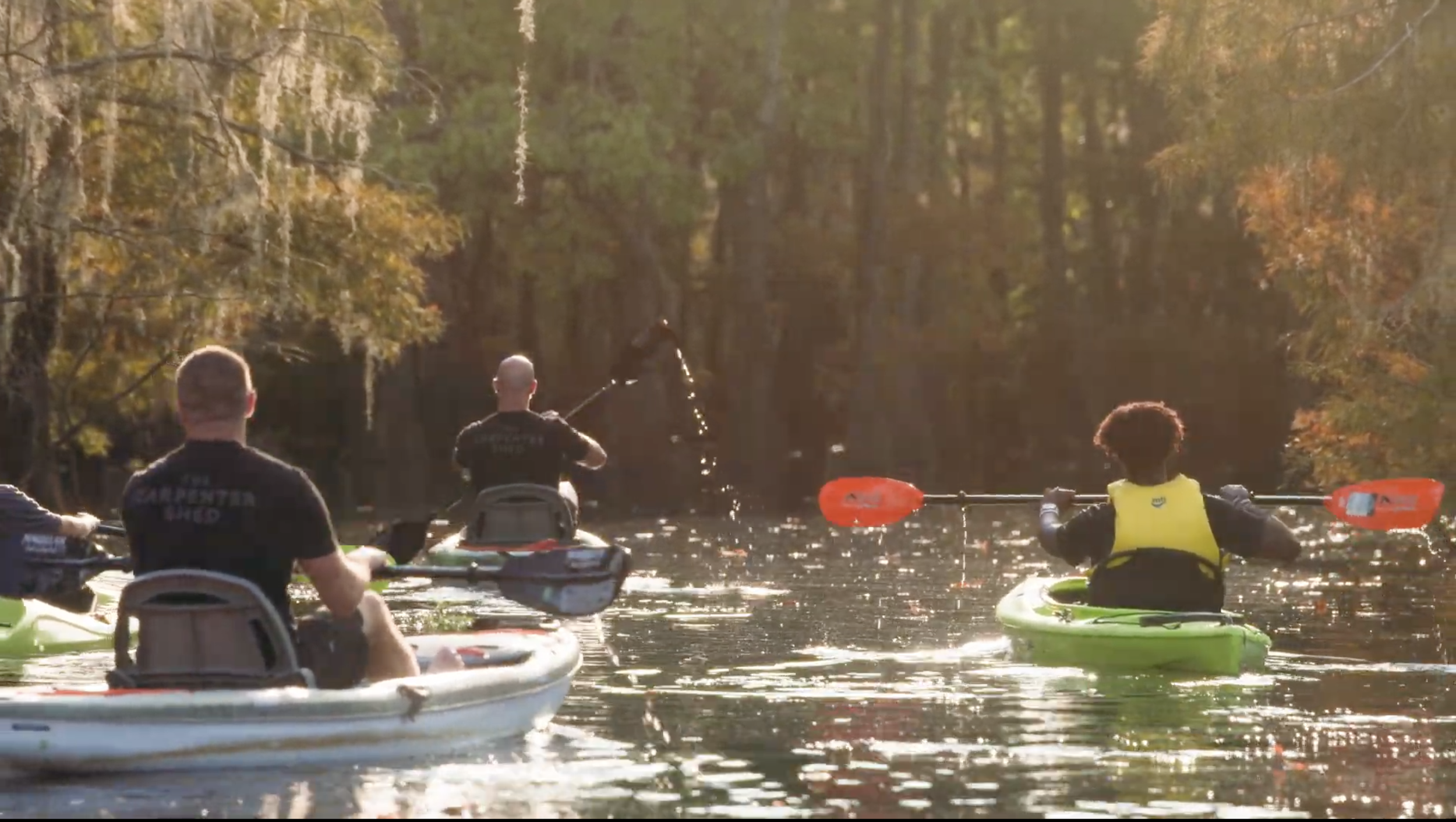Functional Fitness Therapeutic Programming at The Carpenter Shed
Building Resilience Through Fitness-Based Therapy
Adventure is a transformational part of the human experience. Setting out for the unknown, forging your way through uncharted territory, and embracing uncertainty teaches you who you are, what you value, and surprises you with what you’re able to accomplish. This makes you stronger, forces you to look inward, and shows you what you previously thought was impossible is, in fact, all there for you. Using fitness-based therapy, we give our young boys an adventure to show them the impossible is there for them, too.
As we navigate the challenges of daily life, it's essential to find effective coping mechanisms to manage stress, anxiety, and other mental health issues. Fitness-based therapy combines physical exercise with mental health treatment to promote overall well-being. In this blog post, we will explore the concept of this approach and emphasize the importance of coping skills in building resilience and improving mental health.
What is Fitness-Based Therapy and how does it relate to Therapeutic Recreation and Experiential Therapy?
Experiential therapy, or therapeutic recreation, helps individuals identify and cope with different emotions (such as shame, embarrassment, anger, and sadness) and build self-esteem by focusing on activities in a group setting. Its goal is to improve psychological, physical, emotional, and spiritual health, reducing stress, anxiety, and improving decision-making.
Another term widely used in the industry is “Wilderness Therapy”. This type of therapy is heavily broken down by confiscating all possessions at the beginning of treatment, which is a much harsher approach to experiential therapy. Wilderness programs are often barren, without resources, and sparce in terms of living conditions. While The Carpenter Shed has the experiential aspects of coursework, the only thing comparable to wilderness therapy is that our housing is located on 20 wooded acres, and rather than roughing it in the wild, our young men are in a comfortable setting at our two beautiful homes.
Fitness-based therapy is a holistic approach that recognizes the strong connection between physical fitness and mental health. By integrating exercise routines, mindfulness practices, and therapeutic techniques, this form of therapy aims to improve both the physical and emotional well-being of individuals. Engaging in regular physical activity has been shown to release endorphins and dopamine, the body's natural mood elevators, which can help reduce symptoms of anxiety and depression. Additionally, Oxytocin is also released through exercise when we accomplish something challenging. This not only enhances our self-esteem, but it gives us an overall sense of accomplishment that improves our self-worth. By incorporating regular exercise into their routine, individuals can develop healthy coping habits that serve them well in times of stress.
Activities Involved in the Adventure Therapy known as Fitness-Based Therapy
Adventure Therapy uses outdoor settings and expeditions to address behavioral and mental health problems. By putting young men in new, intentionally uncomfortable surroundings and situations, they get to practice working on their mental and physical wellness.
Our approach to fitness-based therapy, in addition to physical exercise, often incorporates mindfulness practices such as deep breathing (body scans), meditation, and other relaxation techniques. These practices can help individuals cultivate awareness of their thoughts and emotions, reduce negative thinking patterns, and enhance their ability to stay present in the moment. This can lead to greater self-awareness, better emotional regulation, and resilience in the face of adversity.
For example, using interval training with cardiovascular machines forces breathing techniques and body scans that help us process what’s happening. We begin asking ourselves, “Can I keep going?”; “Should I stop?”; “Am I going to throw up?” We are learning how to identify with physical and/or emotional stress, so self-negotiation takes over and we choose to keep moving forward or to quit.
Both scenarios have a direct alliance with our past behavior. In the beginning of our fitness journey, they rise to the surface and our “giving up” behaviors try to take over. When we choose to keep going, we develop new patterns and core schemas. For example, “I can finish this”; “I am strong”; “I am determined”; “I believe in myself.” Positive affirmations replace negative core schemas.
Fitness-Based Experiential Therapy Activities
The Carpenter Shed fitness-based experiential activities can be broken into two pieces:
The Physical Aspect: These are our gym efforts with the boys. They complete high-intensity workouts inspired by the fundamentals of CrossFit.
The Experiential Aspect: Outside of our workouts, we work with the young men in practical adventure games like low ropes courses at the park, group hikes, or life-skills exercises (changing car brakes, how to run construction machinery, etc.).
At The Carpenter Shed, residents engage in fitness-based experiential models four times a week in a community atmosphere to help build support and trust while improving self-esteem and self-worth. Our residents work with staff to document progress in fitness progressions on a bi-weekly basis, so when they review documented data and they see their specific improvements in different strengths and movements, it further solidifies their new core schemas. This translates into elevated self-worth and provides a sense of accomplishment so they confidently think, “I can do hard things.”
Nature Therapy: Managing Emotions And Developing Healthy Parent And Peer Relationships
Every activity used in an experiential therapy course has meaning and is directly applicable to the situation or problem each young man faces. If done correctly, therapists and family members should be actively involved in every step of the process so that the participant gets the full benefit of the course and can relate it to their everyday life.
Therapists show them not just how the course applies to their situation, but also how the lessons they learned can be carried into their actions. Therapy reflection sessions can be done both in groups or individually, whichever is best for the participant and how the message is best carried out.
Experiential Family Therapy: The Role Of Parents And Guardians
If done correctly, parents and guardians will play a significant role in their child’s development throughout a fitness-based therapy program. A child will be out on their own, sometimes for the first time in their lives, thrown into challenging situations, and likely undergoing some amount of stress because of the change. They need to know that you support them and are looking out for their wellbeing. A successful program will ensure that the parent is communicating with the child almost as frequently as the therapist.
Why Parents Should Be Involved
The ultimate goal of adventure or experiential therapy is for a child to learn and better themselves so that they can become healthy, hardworking adults. It’s important for them to know they have someone from home in their corner, and staying connected with parents through these situations can help them better relate the lessons they’re learning to their family lives. Parents and guardians should communicate with them as much as possible in whichever way the program recommends/permits (phone call, letter, email, etc.). Although all programs have communication guidelines and recommendations, a healthy one will give you full access to your child no matter what.
Parents should have complete access to the therapists as well so that they can monitor their child’s progress and ensure that they’re getting the care they need. If a program restricts a parent’s access to their child or prevents them from leaving voluntarily, stay away.
Benefits of Fitness-Based Therapy: Encourage Healthy Masculinity, Healthy Relationships and Vital Life Skills
Experiential Fitness-Based Therapy is an excellent way to teach a struggling young man how to better adjust to the realities of life and make stronger decisions for their future. This can help their relationships with both peers and parents or guardians, enhance their livelihood and success, and promote healthy masculinity. By working with The Carpenter Shed’s trained therapists and experiential team, residents can identify their triggers, challenge negative beliefs, and learn new ways to cope with stress and difficult emotions. Here are a few ways it points them in the right direction.
Identify Triggers: Understanding what causes bad habits can help young men avoid falling into them. Seeing where a negative pattern started helps them avoid that trigger or situation going forward.
Challenge Negative Beliefs: Falling into a pattern of poor, destructive behavior can stem from simply failing to recognize intrusive thoughts and negative beliefs. Identifying bad thoughts and how they affect the brain and actions can help young men move past them. Pushing away these triggers can help them form a positive view of themselves and increase self-worth.
Navigating Difficult Emotions: Of course, life always brings negative emotions. The key is being able to navigate them and avoid spiraling. Our program teaches young men how to handle things when life doesn’t go there way so they make smart decisions and calmly put themselves in a better situation.
By integrating fitness-based therapy into our program, combined with cognitive-behavioral strategies, positive affirmations, and goal setting, we help residents develop effective coping skills to support all aspects of life. Over time, residents build a toolbox that they can draw upon to navigate life's challenges with greater confidence and resilience. This further supports a life of purpose, meaning and direction.
At The Carpenter Shed, we’re experts at working with young men that feel unmotivated, frequently engage in dangerous behaviors, and give in to negative peer pressure. Our 6-month long program uses a thematic approach to help boys understand the key domains for living a healthy life and shines light on what is truly important. It’s broken up into four phases: Reset, Rebuild, Redefine, and Renew. Each one works to set your child up for a successful, independent, and rewarding future.
Contact us to learn more about our unique approach to experiential therapy and sober living.
Author:



